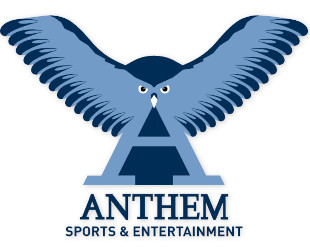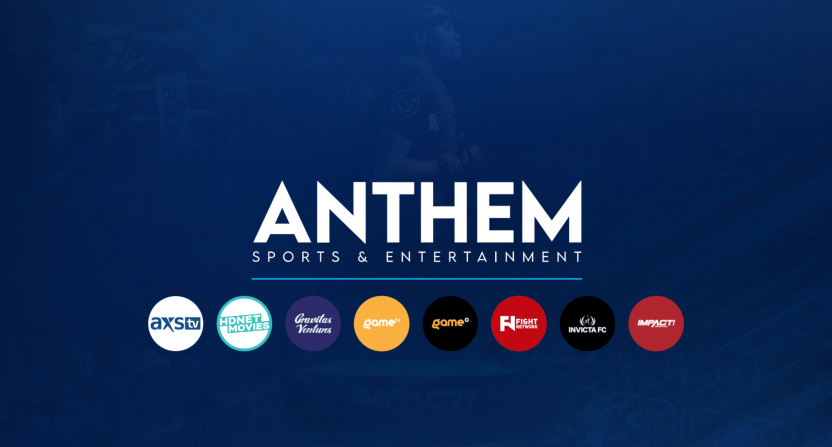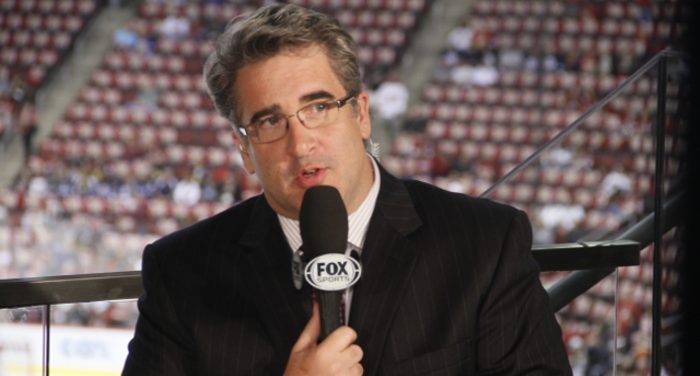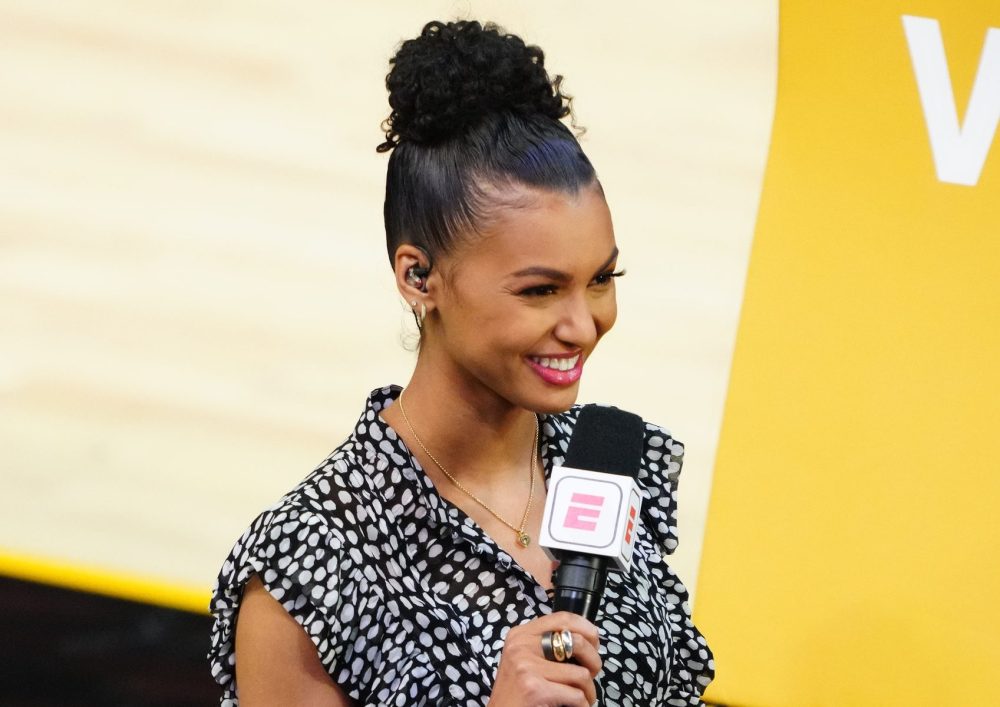Canadian company Anthem Sports & Entertainment has built quite the interesting portfolio in the sports space and beyond over the last decade. Launched in 2010, they own both distribution networks (Fight Network, AXS TV, HDNET Movies, GameTV, Game+ and more) and content properties (Impact Wrestling, Invicta FC, and more), and they have a heavy focus on getting those properties around the globe. Anthem chief corporate officer Ed Nordholm, who’s been involved since that 2010 start, recently spoke with AA on the company’s past, present and future.
Nordholm started his corporate career as a mergers and acquisition lawyer, then went into real estate work, and then started working for a restructuring fund that handles distressed assets. He said it was a personal connection with a friend that got him to shift his focus over to sports media, starting just with Fight Network; Nordholm invested along with a group, and then they got prominent Canadian media executive Len Asper (who had just left a role as CEO of newspaper and TV chain CanWest Global) involved. Asper did that under the new Anthem Sports & Entertainment banner, and Nordholm said his particular focus gave them ideas of how to grow this further.
“We found him to get involved in Fight Network. And what he had in mind, during his CanWest [Global] days, they had been the Canadian broadcaster for all the Scripps properties, Home and Garden TV, Food Network, those kinds of very focused television channels. What he had seen in that ownership position is how well those properties performed digitally, how the audiences followed it, how the advertising followed it. So we had the marketing crash and advertising slump in 2008-10, the advertisers and channels that did well notwithstanding were those channels like Food Network that had strong endemic levels of advertising.”
“And what Len decided he wanted to do post-CanWest was do the same thing as Scripps for men, but more focused on sports content, investing in the content side of those where you knew you have a targeted market and you knew you would likely have an endemic group of advertisers that would support the content because they knew exactly what kind of people we would be talking to. And Fight Network was the inaugural step to test that thesis; he bought a minority position with the right to take control, he got control. And through control, we continued to build the company.”
Nordholm said their ownership of Fight Network led to the acquisition of TNA, now Impact Wrestling, after that company ran into financial trouble.
“Fight Network, we built that business, it’s very obvious what it is. One of its best performing assets was Impact Wrestling, then known as TNA. They started to get into trouble around 2015-16, we knew that it would be a strong asset. We thought it would be a great opportunity to get involved initially as a minority interest that would give us strategic leverage, security, and global rights to the content as we were expanding outside of Canada. And at some point as [TNA president] Dixie [Carter] got into deeper trouble and sort of leaned into us heavier and heavier, I put my restructuring hat on again and said ‘Hey, she’s not paying us, we need to take control of this thing properly and put it under our umbrella.’ So starting 2017, I went into Impact as operating president, took over, and started rebuilding that business from the ground up.”
Nordholm said he’s pleased with how Impact has turned around since then.
“There have been some bumps along the way, as there always is with a restructuring. We’ve got some unfortunate headwinds here and there. But I think we’ve done a very great job on that, and it’s been great for me to stand back once we got [executive vice president] Scott [D’Amore, in 2018] and his team involved and got that stabilized a bit better. I’m still involved in the Impact Wrestling business, they’re kind of under my portfolio, but they’re no longer day-to-day headaches for me, they’re things that I get the joy I’ve saying ‘I’m involved with that,’ rather than up to my eyeballs every day.'”
He said while Impact was partly a target over that distressed asset status, it also made sense for Anthem to pick up content they had global rights to.
“When we started getting involved in Impact Wrestling, part of it was to make sure we had content to expand Fight Network globally. We needed at least some tentpole. We didn’t want to be always entering a new territory and running around to figure out if we could get rights cleared to launch a network elsewhere. And we started recognizing the value of content, and started to shift our focus a little more to the content side of these communities rather than just the distribution networks to get to those.”
They then followed that blueprint with the acquisition of Invicta FC in April 2021.
“So within that and within the Fight Network side, the next thing that came along obviously was Invicta, the women’s MMA promotion [which they acquired in April 2021]. Shannon [Knapp] had done a fabulous job establishing that brand, it worked under the UFC Fight Pass system for 10 years, it was a well-established brand, but she had recognized that developing a brand under Dana [White] was going to be somewhat limiting in terms of how far she could grow, what she could do with the brand that didn’t interfere with what Dana wanted for the UFC. So [their deal with] Fight Pass came up almost two years ago now and she opted out of renewing there to strike out and find territory where she had bigger latitude to grow, and she chose us as her partner to grow that business. And we’re excited to work with her on that.”
Nordholm said Invicta was in much stronger shape than Impact initially, but it did present some of the same challenges when it came to brand-building and starting under a new banner.
“That’s one that’s not quite in the same category of distressed asset for me to get involved, but it has the same characteristics of starting fresh on a promotion, out from under the built-in distribution of the UFC network, how do we get this brand out and build awareness of it independent of the UFC distribution and build that business? We’ve been working on that for going on almost two years now, and we’ve been pretty successful in that very step-by-step, methodical, bite-sized way.”
“We’re not guys that go in with millions of dollars of advertising and spend like crazy to build brand awareness. We’re much more about taking a measured approach and letting the results speak for themselves and the people find us. With Invicta, we are seeing that progress; we’d like for it to be a little more successful, and we’re obviously challenged by having to launch it in COVID rules, for over a year, that’s kind of a tough thing to do with combat sports. But we’ve had the events, we’ve been building the following.”
He said part of the other work there is getting Invicta licensed so sports betting operators can offer lines on it.
“In the meantime, we’ve been working in the back to build a business case around the product, getting Shannon, getting her Invicta business licensed as a promotion that licensed sports operators can take lines on. We announced a deal with Combat Registry and SIS to start taking live data and feeding it to the sports betting groups, focusing on building that business around gambling; it’s just obvious that’s a great place for us to be, and taking advantage of the rising tide around women’s sports generally. We’re starting to see the traction there, and happy to see that develop as we get more and more jurisdictions where Invicta is licensed and where more and more of the sports betting operators are starting to take our events. And the next step is looking for ways where we can work with those operators to drive eyeballs to their sites and vice versa.”
Not all of Anthem’s assets are specifically sports. They have a minority stake in the hunting and fishing Pursuit Channel, for one thing. But Nordholm said there’s crossover there.
“There is that line of symbiotic relationships among them. We have an interest in a hunting and fishing channel. That’s a minority interest, but the thesis of being there is that hunting and fishing is just a massive population with a passionate community, content that feeds that community, and there’s a natural group of endemic advertisers that will be around whereever you are there. So we’ll look in in the future to either grow our investment there or find other ways to visit that community.”
He said AXS TV is also something that fits in their portfolio, blending a little bit of combat sports with a lot of focused music programming.
“We had a major step forward in 2019 when we bought control over AXS TV. Not so much in the sports side, it’s sort of a variation on that thesis of a sports version of Scripps, but it’s a music-centered channel, and was an interesting channel just by virtue of how it grew up. And of course, it’s had some combat sports as well. We’ve carried that on, but even before we bought it, they’ve always had a home for wrestling and MMA. 15 to 20 percent of their primetime programming has always been in that combat sports space.”
“And beyond that, there is a music space. And for us, the music side is getting back to passionate communities. We never see ourselves going head-to-head with general entertainment, general movie, general this, general that channels where we’re just sort of competing with the Starzes and the Hulus and the Netflixes that have massive budgets and are trying to find as many eyeballs as possible. There will always be an angle where we think we can meet your audience because they’re more identifiable and more targeted.”
Another property Anthem has is Canadian channels GameTV and Game+,. Game+ in particular is interesting, as it began focused on fantasy sports and then pivoted as daily fantasy struggled and then as fantasy and gambling spaces got too crowded.
“Game+ started as Fantasy Sports Network. And Fantasy Sports Network was on the rise, it was identified by our guys as ‘Here’s a content silo that has a massive growing audience that is underserved,’ was underserved by media at the time. Daily fantasy was coming alive. The world was moving away from just your weekly picks on the NFL to daily picks on everything and daily fantasy. So we recognized that there was an opportunity for 24/7 coverage of ‘What’s current, what’s new today?’ So we built the channel around the emergence of fantasy sports. It really got going well, and we got wind in our sails just as the NY AG shut down the [DFS] business for a couple of years in the whole fight around whether it was gambling or not.”
“That stalled us for sure. We’d been growing that business with where that industry was. By the time it all sort of stabilized itself and reorganized itself, we started in that interim period looking at other ways to program the channel. We’ve always kept fantasy sports content in it, but in the meantime, lots of things had sprung up, and it was no longer an underserved market; if anything, it was sort of crowded, an overserved market, some would say. So we started looking at other ways that we could utilize that channel. So we still have fantasy sports there, but we’ve also been kind of priming it more and more for actual gaming, sports betting content, esports. With things like Room 4-4-2, we’re looking for ways to partner with Parleh and others, and we’ll start being a home for that content, and that will help drive viewership to their platforms.”
Anthem’s also interesting for their Canadian roots and location. Nordholm said that can be a hindrance to doing U.S. business at times, but it’s helpful for them in keeping a focus on the global market as well as the North American one.
“It certainly differentiates us a lot of the time. It is interesting for us as we try to figure out how to position ourselves in a [North American] market where all that counts is the U.S. Trying to be a meaningful participant in the U.S. media scene from Toronto is not the most obvious place to be. But the reality is that with the sort of niche focus we have, we’re not trying to be a player in the general U.S. marketplace. There are silos that we’re looking for. And we do always come to the world, and I think it’s a Canadian sentiment generally, with sort of a global view always.”
“And I’ve got to be very careful, I don’t want to say something that could be misinterpreted as a slur on Americans, but I do think being in the American world, if you start in the United States, by definition, you’ve got a big enough market to worry about. You worry about your overseas stuff later. That’s gravy if you can get there. For us, in the Canadian market, we start with a market that is so small relative to everywhere in the world that you know if you have any ambition to be anything more than a cottage industry, you’d better have your views on international markets, whether it be the United States, Europe, Asia, wherever. You know that you have to have a global view on where you want to get to because you’ll never make that much just out of the Canadian market. There’s just not enough of us!”
On that global front, Nordholm cited a recent multi-year deal with DAZN to distribute Impact content in 170-plus countries outside North America (it’s on AXS in North America) as a key step.
“It’s getting our content back out into some of these territories that have just been very challenging for us to reach in a meaningful way over the past four or five years. DAZN is so penetrated in some of these markets, and we know that there’s a wrestling audience, but broadcasters there, for one reason or another, it’s been a challenge getting good quality well-distributed coverage in places like the UK, Europe, Australia, New Zealand.”
 “We’re pretty excited to reestablish ourselves in these territories, have more generous availability of the content there, get back to our fanbase. We know they’re still there, we can see they’re still there from what they watch on our YouTube channel, but it’s how can we make sure they’re getting their regular diet of not only our weekly show, but our monthly specials and everything else we do. I think it’s going to be a seminal transaction for us and will at least pave the way for Impact Wrestling to get back on the road and start getting back in the market in some of these territories where we’ve been dormant for several years now.”
“We’re pretty excited to reestablish ourselves in these territories, have more generous availability of the content there, get back to our fanbase. We know they’re still there, we can see they’re still there from what they watch on our YouTube channel, but it’s how can we make sure they’re getting their regular diet of not only our weekly show, but our monthly specials and everything else we do. I think it’s going to be a seminal transaction for us and will at least pave the way for Impact Wrestling to get back on the road and start getting back in the market in some of these territories where we’ve been dormant for several years now.”
And on the Canadian front, Anthem’s name and screaming owl logo (seen at right) will bring back memories of Rush’s Fly By Night album for many. Nordholm said that’s what inspired it.
“The screaming owl is a homage to that album, and even the name itself.”
On the name front, Rush used to be on (and was one of the first bands on) Anthem Records. That company was acquired by Ole Media Management in 2015. But Ole then rebranded themselves as “Anthem Entertainment” in 2019. And in a “Canada really is a small country sometimes” news, Anthem Entertainment has its offices near Anthem Sports and Entertainment. Nordholm said that can sometimes can lead to some confusion.
“They’re in the building next door to us,” he said. “We have more people come to our office, or go to their office thinking they’re going to us. But they have the priority on the name, so we just happily coexist with it.”







